This article was co-authored by Andrea Rudominer, MD, MPH. Dr. Andrea Rudominer is a board certified Pediatrician and Integrative Medicine Doctor based in the San Francisco Bay Area. Dr. Rudominer has over 15 years of medical care experience and specializes in preventive health care, obesity, adolescent care, ADHD, and culturally competent care. Dr. Rudominer received her MD from the University of California, Davis, and completed a residency at the Lucile Packard Children's Hospital at Stanford University. Dr. Rudominer also has an MPH in Maternal Child Health from the University of California, Berkeley. She is a Member of the American Board of Pediatrics, a Fellow of the American Academy of Pediatrics, a Member and Delegate of the California Medical Association, and a Member of the Santa Clara County Medical Association.
There are 16 references cited in this article, which can be found at the bottom of the page.
This article has been viewed 96,722 times.
Cold sores are caused by a herpes simplex virus, and are very contagious, passed on through touch. About 90% of adults test positive for the infection, even if they have never had symptoms.[1] The sores are small blisters that often appear on and around your lips. They typically heal within two to four weeks.[2] There is no cure or vaccine for the infection, but swift action and diligent hygiene can help you limit the growth and spread of cold sores.
Steps
Treating a Cold Sore
-
1Know the signs. If you have experienced a cold sore before, you may be able to get a sense for when an outbreak is going to occur. You may experience itching, burning, or tingling around your lips about a day before the cold sore appears.[3] If you believe you are about to get a cold sore, you can begin treatment right away and potentially shorten the duration of the outbreak. You can also make sure you don't accidentally spread the virus to anyone by refraining from contact.
- Outbreaks commonly occur when you experience a great deal of stress, are overly tired and fatigued, or when you have a viral infection or fever (cold sores are also known as "fever blisters").[4]
-
2Use an over the counter topical treatment. There are a number of antiviral creams that you can get over the counter without a prescription to tackle cold sores. These are designed to speed up the healing time for the sore, they will not actually get rid of the herpes simplex virus nor will they prevent you suffering from future outbreaks. They will generally only be effective if you apply them soon after the sores appear.[5]
- The antiviral creams to look out for include acyclovir, penciclovir, and docosanol.
- In a study penciclovir was reported to have the highest antiviral effectiveness.
- You will need to apply these creams for four or five days, and up to five times each day.
- When you apply the cream be sure to use a cotton swab or wear a disposable rubber glove so you don't contaminate your hands.
Advertisement -
3Consider an oral antiviral. For many of these creams, there are alternatives in pill form. You can take these orally if you prefer that to a topical cream. Oral medications may be more effective than topical creams. They will certainly not require to touch the sores in any way, which can help limit their spread. If you are uncertain, ask your doctor or pharmacist for advice.[6]
-
4Soothe the pain. As well as the antiviral treatments, you can consider taking some painkilling medicine to ease the pain and lessen the irritation the sores are causing you. If you find yourself battling to avoid itching or scratching the cold sores, try using a non-antiviral cream to lessen the irritation. These will not treat the cold sores or make them heal faster on their own. Ask for pharmacist for a recommendation.[7]
- Regular painkillers such as ibuprofen and paracetamol can be taken to ease the pain of sores.
-
5Use something cold to ease irritation. Applying something cold to the area where you have a sore can also help to relieve the pain and irritation. Lightly hold an ice cube against a sore, or place a cool damp cloth on your face.[8] A cool compress can reduce redness and encourage the sore to heal.[9] Try placing a cool towel on the sores three times day, each time for twenty minutes.
-
6Consider natural remedies. Although natural remedies are unreliable compared to medications, there are a number of things which have been reported as helping tackle cold sores. One of these is L lysine, an amino acid that you can buy as a supplement and as a cream. Modest application to the cold sore may help. Alternatively, propolis, sometimes called synthetic beeswax, is thought to shorten the duration of a cold sore outbreak if applied to the relevant area early and frequently.
- A cream of rhubarb and sage has been cited as a homemade alternative to acyclovir cream.[10]
- Stress has been linked to cold sore outbreaks, so lowering your levels of stress could help.[11]
- A topical ointment of 1% lemon balm or 0.5% aloe can help your cold sore heal if you’re looking for a natural remedy.[12]
Maintaining Good Hygiene
-
1Keep your hands clean. If you want to stop a cold sore from growing or spreading it's essential to ensure that you maintain good hygiene. Keeping your hands clean by regularly washing them with soap and water will limit the chances of it spreading. You should try not to touch the cold sore at all, but you might do it involuntarily, so keeping your hands clean is essential.[13]
- If you do touch the cold sore, be sure that you wash your hands immediately afterwards. If you don't, you could spread the virus to other parts of your body.
-
2Don't risk transporting the virus to someone else. You should be conscious that an important part of maintaining good hygiene is about avoiding the risk of spreading the virus to another person. You can take steps against this by doing simple things, such as not sharing objects which come into contact with the area around your cold sore. Don't share items such as towels, cups, lipgloss, a razor, or toothbrushes.[14]
- It is also important not kiss anybody or perform oral sex. This can transport the virus to your partner.
- If someone has oral sex while they have a cold sore, they can transmit the virus to their partner and cause herpes in the genital area.[15]
-
3Wash your face gently. If you have a cold sore it can be awkward to wash your face. The key thing to remember is that you don't want to irritate the cold sore. Wash your face twice a day and only use mild soap. If this is irritating your sores, consider using just water. Remember to thoroughly wash your hands before you wash your face.
Ensuring You Don't Irritate Your Cold Sore
-
1Don't touch it. If you have a cold sore and want to stop it growing and spreading, it's very important that you resist the urge to touch it, pick it, scratch it, or rub it. Touching a sore is surefire way to exacerbate it and risk spreading to other parts of your body.[16] If you touch the sore there is a risk of the virus spreading to your fingers, a condition known as herpes whitlow.
- It is also possible for your eyes to become infected, potentially leading to scarring, injury and problems with your vision.
- A cold sore can spread to other areas of your skin. If you have eczema this is a particular risk, and can become a serious medical problem.[17]
-
2Cover and protect the cold sore. To try and stop a cold sore from growing, it can be beneficial to cover it in some way that protects it from irritants but doesn't encourage further infection. Cold sore patches containing hydrocolloid gel can be used to cover and protect the sore. They are an effective way to treat skin wounds, allowing them to heal while under the protection of the patch.[18]
- Alternatively, you can gently apply petroleum jelly over the sore to offer it some protection. If you do this be sure that you wash your hands thoroughly first.[19]
-
3Avoid irritants. As well as not touching it, you need to try and make sure no other irritants come into contact with the area where you have the sores. For some people sunlight can trigger outbreaks of cold sores. If this is your experience be sure to use plenty of sunblock to protect your skin, especially around your lips and mouth, or wherever the cold sores usually appear.[20]
- If you have cold sores around your lips and mouth, spicy, salty and acidic food can irritate them. They to avoid these kinds of food when you have a cold sore.[21]
Expert Q&A
-
QuestionHow can I stop a cold sore fast using natural remedies?
 Andrea Rudominer, MD, MPHDr. Andrea Rudominer is a board certified Pediatrician and Integrative Medicine Doctor based in the San Francisco Bay Area. Dr. Rudominer has over 15 years of medical care experience and specializes in preventive health care, obesity, adolescent care, ADHD, and culturally competent care. Dr. Rudominer received her MD from the University of California, Davis, and completed a residency at the Lucile Packard Children's Hospital at Stanford University. Dr. Rudominer also has an MPH in Maternal Child Health from the University of California, Berkeley. She is a Member of the American Board of Pediatrics, a Fellow of the American Academy of Pediatrics, a Member and Delegate of the California Medical Association, and a Member of the Santa Clara County Medical Association.
Andrea Rudominer, MD, MPHDr. Andrea Rudominer is a board certified Pediatrician and Integrative Medicine Doctor based in the San Francisco Bay Area. Dr. Rudominer has over 15 years of medical care experience and specializes in preventive health care, obesity, adolescent care, ADHD, and culturally competent care. Dr. Rudominer received her MD from the University of California, Davis, and completed a residency at the Lucile Packard Children's Hospital at Stanford University. Dr. Rudominer also has an MPH in Maternal Child Health from the University of California, Berkeley. She is a Member of the American Board of Pediatrics, a Fellow of the American Academy of Pediatrics, a Member and Delegate of the California Medical Association, and a Member of the Santa Clara County Medical Association.
Board Certified Pediatrician & Integrative Medicine Doctor A 1% topical ointment of lemon balm oil at the start of the cold sore can help heal it faster. A 0.5% aloe vera extract can also be helpful. If you're a fan of essential oils, mix 5 drops of eucalyptus, 3 drops of bergamot, and 2 drops of tea tree oil in 1 ounce of a carrier oil. Apply that topically to help the cold sore heal.
A 1% topical ointment of lemon balm oil at the start of the cold sore can help heal it faster. A 0.5% aloe vera extract can also be helpful. If you're a fan of essential oils, mix 5 drops of eucalyptus, 3 drops of bergamot, and 2 drops of tea tree oil in 1 ounce of a carrier oil. Apply that topically to help the cold sore heal. -
QuestionWhat cough drops can I take that will not irritate my cold sore?
 Chris M. Matsko, MDDr. Chris M. Matsko is a retired physician based in Pittsburgh, Pennsylvania. With over 25 years of medical research experience, Dr. Matsko was awarded the Pittsburgh Cornell University Leadership Award for Excellence. He holds a BS in Nutritional Science from Cornell University and an MD from the Temple University School of Medicine in 2007. Dr. Matsko earned a Research Writing Certification from the American Medical Writers Association (AMWA) in 2016 and a Medical Writing & Editing Certification from the University of Chicago in 2017.
Chris M. Matsko, MDDr. Chris M. Matsko is a retired physician based in Pittsburgh, Pennsylvania. With over 25 years of medical research experience, Dr. Matsko was awarded the Pittsburgh Cornell University Leadership Award for Excellence. He holds a BS in Nutritional Science from Cornell University and an MD from the Temple University School of Medicine in 2007. Dr. Matsko earned a Research Writing Certification from the American Medical Writers Association (AMWA) in 2016 and a Medical Writing & Editing Certification from the University of Chicago in 2017.
Family Medicine Physician Most cough drops will not irritate your cold sore if the sore is on the outside of your mouth. Try Halls, Cepacol, or Ludens — these might work best for you.
Most cough drops will not irritate your cold sore if the sore is on the outside of your mouth. Try Halls, Cepacol, or Ludens — these might work best for you.
Warnings
- Be alert for signs of a secondary infection, such as a high temperature, greenish-yellow puss, or swelling. Go to a doctor if you experience of any of these.⧼thumbs_response⧽
- You should contact a doctor if the pain is such that you cannot eat or drink, you have sores on your genitals, near your eyes or nose, or any redness, pain or swelling in your eyes.⧼thumbs_response⧽
- If the sores don't heal after two weeks, or new sores keep developing, contact your doctor.[22]⧼thumbs_response⧽
References
- ↑ https://www.health.ny.gov/diseases/communicable/athletic_skin_infections/herpes.htm
- ↑ https://my.clevelandclinic.org/health/diseases/21136-cold-sores
- ↑ https://www.hopkinsmedicine.org/health/conditions-and-diseases/herpes-hsv1-and-hsv2/oral-herpes
- ↑ https://www.hopkinsmedicine.org/health/conditions-and-diseases/herpes-hsv1-and-hsv2/oral-herpes
- ↑ https://www.hopkinsmedicine.org/health/conditions-and-diseases/herpes-hsv1-and-hsv2/oral-herpes
- ↑ https://my.clevelandclinic.org/health/diseases/21136-cold-sores
- ↑ https://www.nhs.uk/conditions/cold-sores/
- ↑ https://www.healthyhorns.utexas.edu/HT/HT_coldsores.html
- ↑ https://health.clevelandclinic.org/heres-how-you-can-get-rid-of-a-cold-sore-fast/
- ↑ https://pubmed.ncbi.nlm.nih.gov/11799306/
- ↑ https://medlineplus.gov/ency/article/003059.htm
- ↑ Andrea Rudominer, MD, MPH. Board Certified Pediatrician & Integrative Medicine Doctor. Expert Interview. 13 April 2020.
- ↑ https://www.plannedparenthood.org/learn/stds-hiv-safer-sex/herpes/how-is-herpes-prevented
- ↑ https://www.aad.org/dermatology-a-to-z/diseases-and-treatments/e---h/herpes-simplex/tips
- ↑ https://www.betterhealth.vic.gov.au/health/conditionsandtreatments/cold-sores
- ↑ https://healthyhorns.utexas.edu/HT/HT_coldsores.html
- ↑ https://www.aad.org/public/diseases/eczema/childhood/health-concerns/cold-sores
- ↑ https://www.nhsinform.scot/illnesses-and-conditions/mouth/cold-sore
- ↑ http://www.huffingtonpost.com/thomas-p-connelly-dds/cold-sores-how-to-treat-get-rid-of_b_848207.html
- ↑ https://www.nhsinform.scot/illnesses-and-conditions/mouth/cold-sore
- ↑ https://www.nhsinform.scot/illnesses-and-conditions/mouth/cold-sore
- ↑ https://www.healthyhorns.utexas.edu/HT/HT_coldsores.html
About This Article
To stop a cold sore from growing, hold an ice cube against it to ease irritation and then cover it with petroleum jelly. While you’re treating it, avoid irritating your cold sore by resisting the urge to touch it, pick it, or scratch it. Touching the sore makes it more likely for the virus to spread to other parts of your body. If you frequently suffer from cold sores, apply an over-the-counter antiviral cream like penciclovir 5 times a day, for 4 or 5 days. For more advice from our Medical co-author, including how to soothe your cold sore, read on!
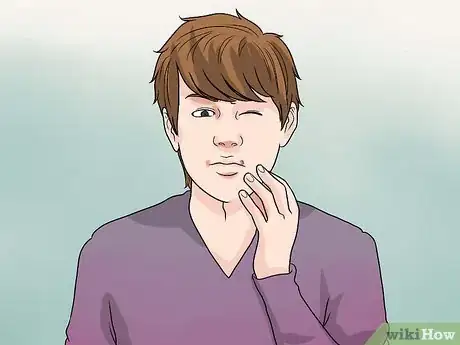
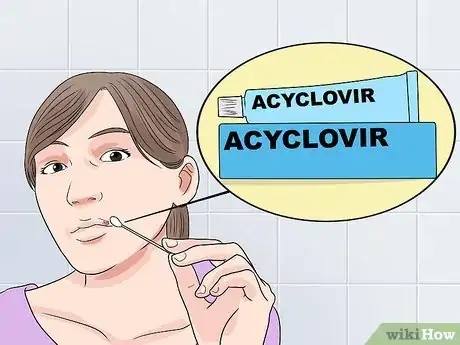
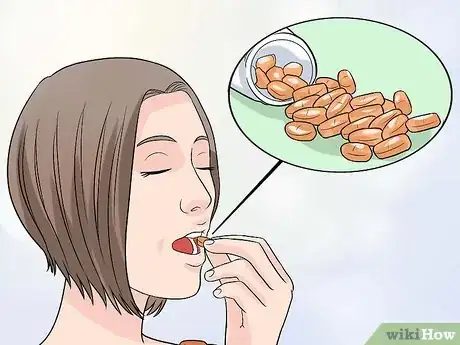
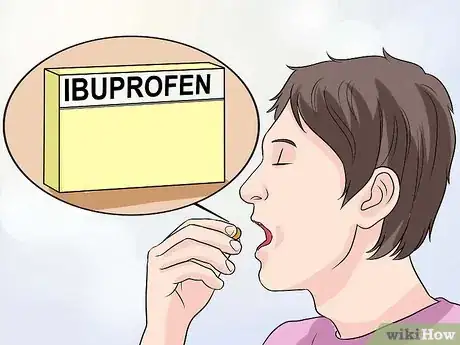
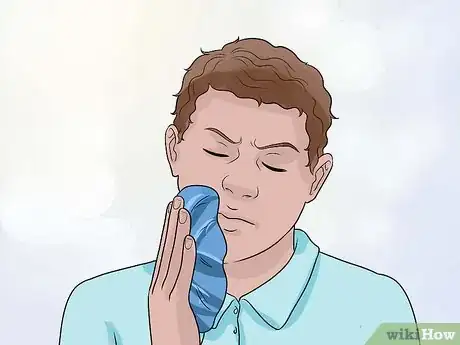
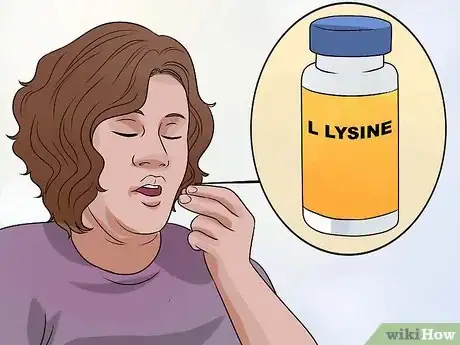

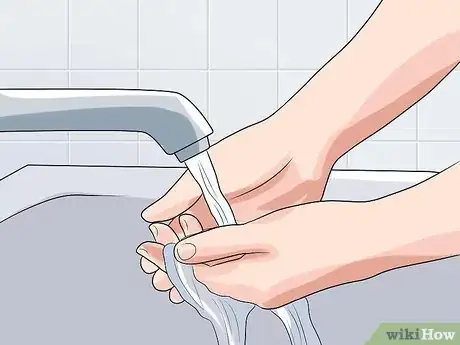
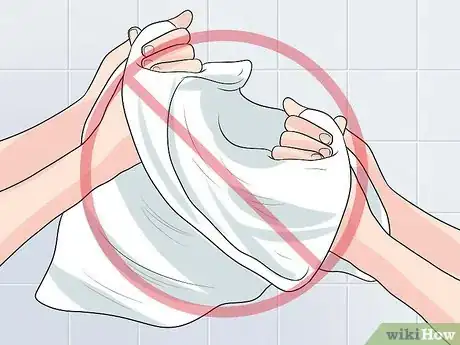
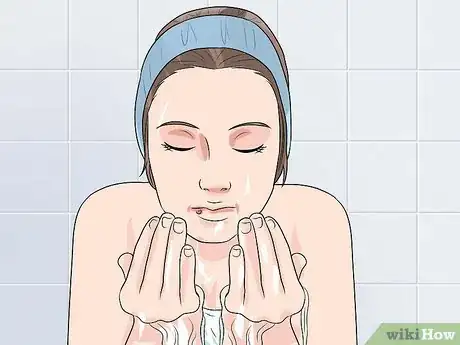
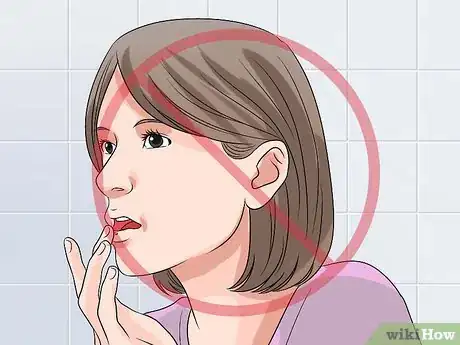
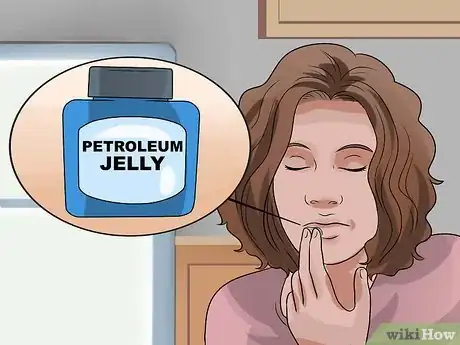
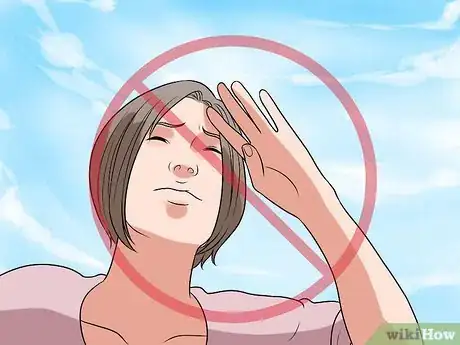
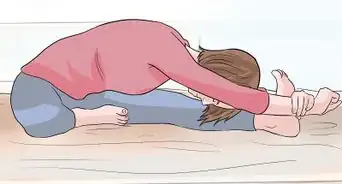


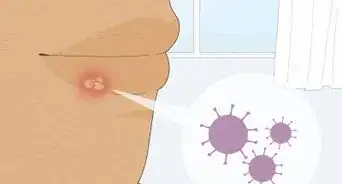




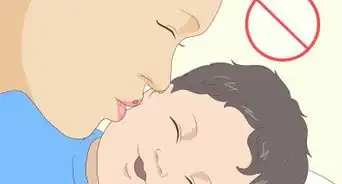

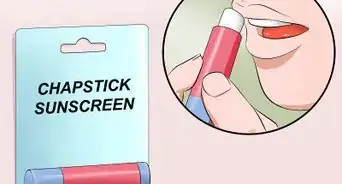
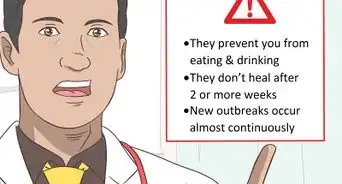
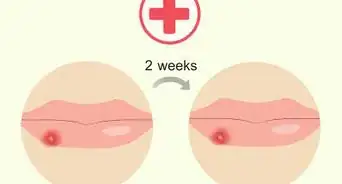







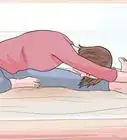

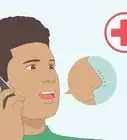
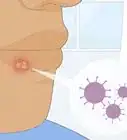




































Medical Disclaimer
The content of this article is not intended to be a substitute for professional medical advice, examination, diagnosis, or treatment. You should always contact your doctor or other qualified healthcare professional before starting, changing, or stopping any kind of health treatment.
Read More...